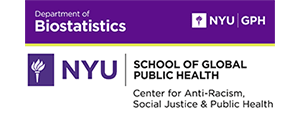2025 Fostering Diversity Sponsors
The Fostering Diversity in Biostatistics Workshop has been held at the annual ENAR Spring Meeting since 1999. This day-long workshop aims to increase the number of quantitatively skilled young scholars from under-represented minority groups enrolling in advanced degree programs in Biostatistics, so as to promote their participation in and contributions to our field. The next workshop is planned for the ENAR 2025 Spring Meeting in New Orleans, Louisiana.
ENAR would like to thank our Fostering Diversity Workshop Sponsors for their continued support.
Interested in sponsoring the FDBW? Please complete the form here or email enar@enar.org.
Coalition Sponsors
Platinum Level
Emory Rollins School of Public Health
The Rollins School of Public Health fosters a culture of inclusion and organizational equity by leveraging the many intersections of race, ethnicity, gender, religion, socioeconomic status, sexual orientation, gender expression, disability, diversity of thought, and other aspects of lived experience in our community. We intentionally recruit, support, and mentor faculty, staff and students who are members of communities that are underrepresented in the public health and scientific workforce, and reflect the multicultural and global communities that Emory serves. Building an academic community where all members are able to thrive enhances our scholarly mission to eliminate health disparities and improve health outcomes in disadvantaged and vulnerable populations.
The Ohio State University, College of Public Health, Division of Biostatistics
The Division of Biostatistics, College of Public Health, The Ohio State University has training programs leading to an MPH and MS in Biostatistics. Additionally, we offer an Interdisciplinary PhD in Biostatistics in partnership with the Department of Statistics at OSU. Faculty lead and collaborate on scholarship with partners across the university and with peers across the nation using a spectrum of mathematical and statistical approaches to help analyze and solve vexing biological, medical and public health challenges.
University of Michigan
The Department of Biostatistics at the University of Michigan School of Public Health is rated No. 1 in the country among biostatistics programs at public institutions, per U.S. News & World Report. We bring biostatistical design and analysis expertise to a wide spectrum of health-related issues. Our faculty, students, and staff work in important and diverse areas of current biostatistical research; including Bayesian methods, causal inference, clinical trials, electronic health records, high dimensional inference, image analysis, longitudinal data analysis, machine learning, methods for missing data, mobile health, personalized prevention and treatment, statistical computing, statistical genetics, genomics and bioinformatics, survey research, and survival and event history analysis.
Gold Level
Brown University, School of Public Health, Department of Biostatistics
TThe Department of Biostatistics, within the School of Public Health at Brown University, offers a PhD program in Biostatistics as well as residential and online ScM programs, and an undergraduate concentration. The department is the home of the Center for Biostatistics and Health Data Science at Brown University. The mission of the Department of Biostatistics is to generate new discoveries in theory and methods of statistics and data science, to provide statistical expertise and leadership and promote interdisciplinary research in domain areas related to human health and the life sciences, and to develop future researchers and professionals in the field of biostatistics.
University of Pennsylvania
The Division of Biostatistics within the Department of Biostatistics, Epidemiology and Informatics (DBEI) in the Perelman School of Medicine was launched at the University of Pennsylvania in 1997. The Division provides the academic home for 35 primary biostatistics faculty, as well as for the scientific discipline and training programs in biostatistics, teaching biostatistics at the graduate (PhD, MS) and postgraduate (MSCE, MTR, MSHP) levels. In the fall of 2000, the Division welcomed their first incoming class of PhD students.
Biostatistics faculty lead scientific methodology research programs, as well as collaborate as co-investigators with basic science, translational, clinical research and health services research investigators throughout Penn Medicine, across the entire spectrum of diseases and outcomes. These research investigations include novel biostatistical methodology development, conduct of nationally distributed multi-center clinical trials and clinical research networks, collaboration with biomedical, behavioral, clinical and translational research teams across multidisciplinary scientific disciplines.
Silver Level
Johns Hopkins Biostatistics Department
Founded in 1918, the Johns Hopkins Biostatistics Department is the oldest department of its kind in the world and has long been considered one of the best. With a rich history of outstanding contributions in both research and education, we are dedicated to: advancing statistical and data science, making discoveries to improve health by partnering with our colleagues in other science domains, and providing an innovative and outstanding biostatistics education for those seeking to be conversant with concepts as well as for users and experts in the application and development of new methodology. We do these with a focus on diversity, inclusion, and a strong spirit of collegiality and community.
Bronze Level
Boston University School of Public Health
Biostatistics plays a crucial role in public health research and policy and is one of the most interdisciplinary departments at the Boston University School of Public Health. By designing studies, developing new methodologies, and analyzing data, we help inform decisions that promote better health.
Our faculty members are internationally recognized for their methodological innovations in clinical trials, observational studies, statistical genetics analysis, and Bayesian methods. They have a strong history of collaboration to tackle some of the world’s most pressing public health issues and are dedicated to training the next generation of students. This ensures they are equipped with advanced methods and technological skills to address emerging public health and medical challenges.
Our active research areas include genetic studies of risk factors for breast cancer, safety and efficacy assessments of a new Alzheimer’s disease drug, comparisons of patient outcomes with different behavioral interventions, and studies aimed at identifying both genetic and non-genetic factors related to healthy aging and extreme human longevity.
NYU School of Global Public Health-Department of Biostatistics
The Department of Biostatistics at NYU GPH is engaged in three inter-related activities that aim to improve Public Health through rigorous research and that educate future practitioners, leaders and researchers. We strive for excellence in:
- innovative and groundbreaking methodological research that is relevant to critical Public Health research
- collaborative research in pressing and important Public Health issues;
- education and training of students from diverse backgrounds in cutting edge statistical methods for design and analysis of studies used in Public Health research, as well as theoretical foundations that will serve as the basis for future innovations.
The Center for Anti-Racism, Social Justice and Public Health (CASJPH) is dedicated to developing anti- racism and social justice public health research, policies approaches and model practices. Our mission is to translate research into policy, practice and action by bringing together the best minds from multiple disciplines to examine how racism contributes to health inequity and to reduce race- related illness and premature deaths among BIPOC communities.
NYU Langone Health – DPH Biostatistics Division
NYU Langone comprises six inpatient locations and more than 300 outpatient sites across the New York metropolitan area and in Florida, all connected by a single electronic health record system, the NYU Langone Health app, and the NYU Langone Health MyChart patient portal.
NYU Langone’s inpatient locations consistently receive “A” ratings in the Leapfrog Group’s Hospital Safety Grade and Vizient, Inc., named NYU Langone the No. 1 hospital in the nation for quality and patient safety. Additionally, U.S. News & World Report included NYU Langone on its “Best Hospitals Honor Roll,” ranking 10 of its clinical specialties among the top 10 in the nation, and the Centers for Medicare and Medicaid Services (CMS) awarded NYU Langone five stars for safety, quality, and patient experience.
NYU Langone’s vast outpatient network has been awarded the Ambulatory Quality and Accountability Award from Vizient, Inc., every year since the award’s inception in 2015 – and it has been named the No. 1 physician practice by Vizient in all but one of those years. This distinction recognizes NYU Langone’s consistent excellence in delivering high-quality care in five key domains: access to care, quality, efficiency, continuum of care, and equity.
UNC Chapel Hill – Department of Biostatistics
The Department of Biostatistics in the Gillings School of Global Public Health of the University of North Carolina at Chapel Hill is consistently rated one of the top biostatistics programs in the country. The Department was established in 1949 with the goals to advance statistical science and, ultimately by its application, to improve human health. To achieve these goals, the Department of Biostatistics offers training and research programs to develop and apply innovative statistical methods to problems of human health and disease, including basic biomedical sciences. The Department’s mission is to forge dramatic advances in health science research that benefit human health in North Carolina, the US, and globally through the development of profound and paradigm-shifting innovations in biostatistical methodology and the thoughtful implementation of biostatistical practice to solve public health problems.










